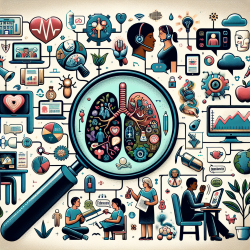The global health landscape is evolving, and with it, the challenges faced by healthcare practitioners worldwide. While significant strides have been made in combating infectious diseases, the spotlight is now shifting towards non-communicable diseases (NCDs), which account for a substantial portion of global health loss. Among these, a group of 'forgotten' NCDs demands urgent attention and action.
The Burden of Forgotten NCDs
The research article "Remembering the Forgotten Non-Communicable Diseases" highlights that while diseases like cardiovascular conditions and diabetes are well-recognized, 55% of the global NCD burden comes from other conditions that are often overlooked. These include musculoskeletal disorders, chronic kidney disease, asthma, dementia, gout, substance abuse disorders, and liver cirrhosis. These conditions primarily cause health loss through chronic disability rather than premature death.
Why These NCDs Matter
- Chronic Kidney Disease (CKD): Affects 1 in 10 adults globally and serves as a risk multiplier for other conditions such as diabetes and cardiovascular disease.
- Asthma: A common chronic condition with significant morbidity that requires continuous care and access to affordable medications.
- Dementia: With an aging population, dementia is becoming a major cause of disability and dependence among older adults.
- Liver Cirrhosis: Primarily caused by excessive alcohol consumption and hepatitis, it remains a leading cause of death globally.
- Sickle Cell Disease: Despite being preventable with early detection and care, it remains largely invisible on the global health agenda.
Integrating Research and Policy for Better Outcomes
The article emphasizes the need for a strategic focus on these neglected NCDs to engender a global response similar to that seen for neglected tropical diseases. This involves integrating research across biomedical sciences with health systems and population-based studies to enhance policy and patient outcomes.
Steps Practitioners Can Take
- Enhance Data Collection: Improve systems for collecting data on causes of death and disability to reduce ignorance about the true burden of these conditions.
- Focus on Cost-effective Strategies: Identify and implement strategies that are both cost-effective and appropriate for different populations.
- Promote Established Interventions: Increase awareness of existing interventions that can control the impact of these NCDs.
- Raise Awareness: Advocate for these conditions in national and global health forums to highlight their importance.
The Role of Practitioners in Global Health
Practitioners play a crucial role in addressing these forgotten NCDs by implementing evidence-based practices and advocating for policy changes. By focusing on prevention, early detection, and comprehensive management strategies, healthcare providers can significantly reduce the burden of these diseases.
The journey towards addressing forgotten NCDs requires collaboration among researchers, healthcare providers, policymakers, and communities. By fostering an integrated approach that combines clinical care with research and policy development, we can make substantial progress in improving global health outcomes.
If you are interested in delving deeper into this topic and exploring how you can contribute to this critical area of global health, I encourage you to read the original research paper: Remembering the forgotten non-communicable diseases.










